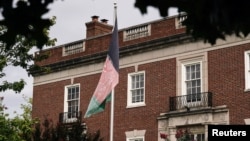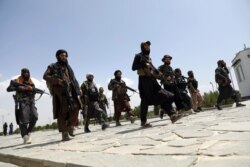Diplomats of the former Afghan government who have held on to their jobs in the U.S. are grappling with a new problem: their official bank accounts have been suspended.
Two senior Afghan diplomats, who did not want to be named because the issue is under discussion with U.S. officials, confirmed to VOA that the Citibank accounts of the embassy in Washington and two Afghan consulates in the U.S. have been suspended for more than a month.
The Afghan mission in Washington does not receive funds from Kabul, because the Afghan capital now under the control of the Taliban, and it has survived thus far through dwindling consular service fees.
The consulates have run out of new passports but continue to renew expired passports. Because checks issued to cover passport renewal can no longer be made out to the Afghanistan Embassy, the remaining staff members deposit blank money orders into personal bank accounts, then meet at the end of each month to tally embassy revenue.
"We've held talks with the Department of State, but so far there has been no breakthrough," one Afghan diplomat said, adding that U.S. officials had advised the diplomats against discussing the matter publicly.
While the government they represented collapsed more than five months ago, about 90 Afghan diplomats remain in four diplomatic posts in the U.S., including the Afghanistan Permanent Representative at the United Nations in New York.
Suspension of their official bank accounts has adversely impacted the embassy's financial transactions, including salaries, rent and health care insurance payments, the diplomats said.
When asked about the status of the mission's accounts, a State Department spokesperson told VOA, "There has been no change in the accreditation status of Afghan mission members," but declined to comment on the account suspensions.
A spokesman for Citibank also declined to comment.
Policy confusion?
The United States does not recognize the Taliban's self-declared Islamic Emirate as the official government of Afghanistan, but U.S. officials have met with Taliban officials in Qatar, Norway and elsewhere.
"As we seek to address humanitarian crisis together with allies, partners, and relief [organizations]," U.S. special envoy for Afghanistan Thomas West said before holding talks with the Taliban foreign minister, Amir Khan Muttaqi, in Oslo on Sunday. "We will continue clear-eyed diplomacy with the Taliban regarding our concerns and our abiding interest in a stable, rights-respecting and inclusive Afghanistan."
Analysts say the U.S. approach has led to confusion among Afghans who are trying to sort out visa and logistical issues, leaving them in legal limbo.
"Not thinking through the ramifications and implications of having these two parallel governance structures going at the same time is a completely flawed approach," said Candace Rondeaux, an expert at the Washington-based New America think tank.
"I think the U.S. has been confused on Afghanistan for a long time," said Jennifer Murtazashvili, an expert with the Carnegie Endowment for International Peace, adding that the U.S. will need a functioning Afghan mission to handle consular services for the tens of thousands of Afghans who are being brought to the U.S. since the collapse of the former Afghan government.
The loss of the bank accounts is the latest blow to the Afghan diplomatic mission, which has already been laboring under severe financial restrictions.
Calls to the embassy are directed to a voice message system as all local staff have been laid off, and diplomats say they have been working on-and-off on a voluntary basis and without pay for two months.
The embassy in Washington, like many other Afghanistan diplomatic missions around the world, has refused to work with the Taliban foreign ministry, and diplomats say they represent the former Islamic Republic of Afghanistan.
Despite repeated Taliban pleas for recognition of the Islamic Emirate as the de facto government of Afghanistan, no country has yet officially taken steps to recognize the regime.
Diplomats seeking asylum
At least three Afghan diplomats who worked at the embassy in Washington have sought asylum in Canada and the rest are exploring long-term options, the two diplomats said.
"Obviously, we cannot return to Afghanistan," one of the diplomats said, adding that his diplomatic visa is set to expire in December. "We are seeking a solution for the future of all our diplomats here."
Anticipating their move, the U.S. Citizenship, Immigration and Customs agency has announced specific steps for the Afghan diplomats to change their status in the U.S.
"If you are an Afghan national who entered the United States as an A-1, A-2, G-1, or G-2 nonimmigrant; were performing duties that were diplomatic or semi-diplomatic on July 14, 2021; and are seeking a Green Card under Section 13, you may file Form I-485, Application to Register Permanent Residence or Adjust Status, without a fee," reads a public notice at the USCIS website.
State Department Bureau Chief Nike Ching contributed to this story.






